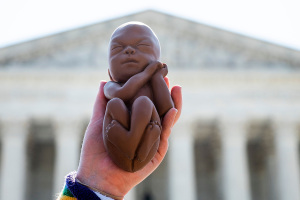Christian Professor Bursts the Myth of 'Dying Christianity'
Contrary to critics in the mainstream suggesting Christianity's death might be near due to the rise of the "nones" or "religiously unaffiliated" in the United States, the faith is at its most important and promising moment in history, argues a young pastor and professor of religion.
The Pew Research Center polling last October showed that one-fifth of the people in the U.S. – and a third of adults under 30 – do not identify with any religion, which led many in the secular press to project Christianity as a dying religion. But the view that Christianity is "on a respirator" overlooks the evidence of the growing influence of the faith, says Johnnie Moore, a vice president, professor of religion, and campus pastor at the nearly 100,000-student Liberty University in Virginia, in an article for Fox News.
While some media critics of Christianity "have lost their minds touting" the so-called rise of the "nones" in the U.S., they fail to note that nearly 70 percent of them still admit to believing in God. In fact, one-in-five of America's "least religious" say they pray every day, Moore points out, suggesting that many devoted Christians, tired of cultural and denominational labels, have opted to be classified as "unaffiliated" rather than be stereotyped.
Never before have masses of evangelicals and Catholics been more engaged in the public square, he writes in the article published Sunday. He says Jerry Falwell's Moral Majority – a prominent political organization of Christian conservatives – has been multiplied a thousand times over, "cementing the role of evangelicals and Catholics in every major election since Ronald Reagan."
Even in last November's presidential election, evangelicals represented more than one-fourth of the electorate – the highest ever – with over three-fourth of them voting for a single candidate, though a Mormon.
Moore also cites the example of former Arkansas Gov. Mike Huckabee, who is among those who have "the ability to instantly mobilize millions of Christians in support of causes that matter to them." Even the Obama administration's hostility toward religious liberty didn't shove people of faith into obscurity, he adds. "The bullying ignited a powder keg of religious liberty that has produced unprecedented solidarity among Catholics and Evangelicals, almost like we've never seen before."
Christianity is growing fast around the world, Moore says. Thanks to the Internet, Christianity is witnessing an explosive growth around the world, he points out. Brazil's evangelical population has swelled by 30 percent in the last decade – even faster than its economic boon. China has become an incubator for Christianity, and the church in Africa is an indigenous force that influences every facet of the continent's society.
An Evangelical Leaders Survey, conducted among top evangelical leaders in the nation and released in 2009, showed that while there is overwhelming optimism on the growth of Christianity in the world, there is mostly pessimism when it comes to the future of the faith in America.
A Gallup survey showed last July that only 44 percent of Americans had a great deal or a lot of confidence in religion. This number was lower than the 48 percent scored in 2011, and lower than the previous all-time low of 45 percent reported in 2002.
However, some Christians are optimistic about the future of Christianity in America. In his book, The Next Christians: The Good News About the End of Christian America, young evangelical leader Gabe Lyons says that while the current system of Christianity in the nation is dying, a new generation of Christians that seeks to restore the world as God intended is rising.
For too long, Lyons contends, Christianity in America has only told part of the story – the fall (sin) and salvation – but failed to tell the grand narrative. While saving souls is indisputably important, Lyons contends, Jesus also calls on Christians to restore the broken things to how it ought to be. "The next generation [of Christians] understands restoration as connected to the Gospel. They are motivated by the fact that Jesus restored their own soul and is constantly in the process of restoring them," Lyons earlier explained while speaking to The Christian Post.
Moore also points to the tens of thousands who hold worship services each Sunday even today in numerous megachurches across the nation.
Moore concludes his article with a quote by Theodore Beza, the 17th century French Protestant Christian theologian, who said, "The church is an anvil which has worn out many hammers."



























